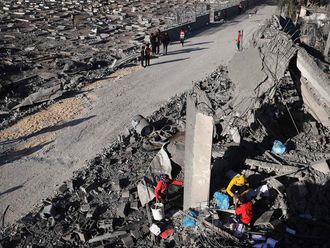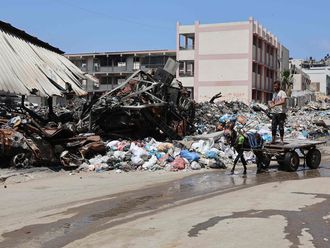
Cairo: The climate in countries including Egypt, Greece and Saudi Arabia is projected to warm by about 9 degrees Fahrenheit (5 degrees Celsius) by the end of the century, the study said. Such a rapid increase will cause longer heat waves, more severe drought and frequent sandstorms from the beaches of Lebanon to the deserts of Iran.
The changes will also affect vegetation and freshwater resources, raising the risk of armed conflict, the report said. It was first published in June in the Review of Geophysics but was recently updated to include new global climate projections ahead of the UN climate summit in November.
The study’s authors, including researchers from the Cyprus Institute’s Climate and Atmosphere Research Centre and the Max Planck Institute for Chemistry in Germany, blamed growing greenhouse emissions for the region’s rising temperatures. The area’s arid landscapes and low water levels also make it more vulnerable to climate change, they said.
The Middle East has become a “dominant emitter” of greenhouse gases globally, overtaking both the European Union and India, according to Georgios Zittis, one of the report’s authors.
“In the EU we are seeing a declining trend of emissions, but this is not the case for the Middle East,” Zittis said in a phone interview. Most countries in the region, he said, are committed to the 2015 Paris climate agreement, which aims to limit global warming in this century to 2.7 degrees Fahrenheit (1.5 degrees Celsius).
Demand for fresh water to rise
The report emphasises the pressing need to “decarbonise” the energy and transportation sectors in the Middle East with more widespread use of renewable energy, even as the economies of several countries in the region, such as Qatar and Saudi Arabia, rely heavily on “fossil fuel exploitation.”
The researchers found that summers in the region have become drier and that extreme precipitation and rainfall have occurred in less frequent but stronger spurts. The heat waves will restrict outdoor activities and affect key Mediterranean crops such as olives, wheat and barley.
Demand for freshwater will increase as the population grows and there is a strain on resources, the report said. According to Zittis, the region will probably see an increase in migration from rural to urban areas, whether internally or across borders.
In southern Iraq, where temperatures have increased by 3.2 degrees Fahrenheit (1.8 degrees Celsius) over the past three decades, families have sold their belongings and relocated to such urban centers as Basra, the region’s largest city.
Zittis says that the transition will not be easy and that “multiyear droughts” and competition for resources will trigger conflicts. “Where there is social instability, this could be the result of climate change,” he said.












